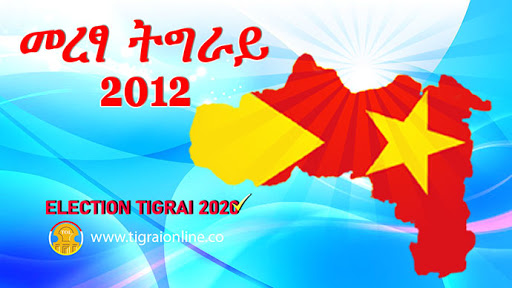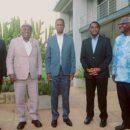
Debating Ideas is a new section that aims to reflect the values and editorial ethos of the African Arguments book series, publishing engaged, often radical, scholarship, original and activist writing from within the African continent and beyond. It will offer debates and engagements, contexts and controversies, and reviews and responses flowing from the African Arguments books.

Last week, the Tigrai region of Ethiopia held elections in conformity with the established schedule but in defiance of the federal government headed by PM Abiy Ahmed. The elections were peaceful and credible. The result is two governments, one in the Tigraian capital Mekelle and one in the federal capital Addis Ababa, that do not recognize each other’s legitimacy. It is the most serious political crisis in recent Ethiopian history.
The origin of the dispute and crisis is the decision by the federal government to postpone national elections without consensus on the legality of continuing in power beyond the date on which its constitutional mandate expires, which is this month. The pretext for the postponement was the Covid-19 pandemic; but many believe it was rather the PM’s motivation to avoid an electoral test for his new and yet to be consolidated Prosperity Party.
The Ethiopian House of Peoples Representatives decided to postpone federal and regional elections until such a time that the WHO declares the end of the global pandemic and its health risks. The upper chamber – the House of Federation (HoF) – then decided that the current government would remain in power until the undetermined date for elections.
The Tigray People’s Liberation Front (TPLF) and several other opposition groups accepted the delay of the election but called for dialogue to agree on how to transition into an elected government when the current term expires by the end of September 2020. They argued that a unilateral extension was unconstitutional and illegitimate.
The TPLF went beyond explaining its opposition and its government declared that it would hold its regional elections as scheduled, referring to constitutional provisions that recognize its right to do so. It demanded the National Elections Board (NEBE) run its planned regional elections. However, the NEBE rejected this and the region had to find a way of running them on its own.
Preparations for the regional election of Tigrai
On 6 August, the Tigrai State House amended article 48/2 of its regional constitution and changed the first past the post clause in the constitution to a mixed electoral system. It determined 80% of the parliamentary seats be filled on a constituency basis and the remaining 20% for minority parties be allocated through proportional representation.[1] The State House also instituted the Tigrai Election Commission and soon after appointed its commissioners in consultation with the regional opposition parties that were ready to participate in the elections.
The commission inherited the previous regional structure of the National Electoral Commission, reoriented it with the new electoral system, determined registration and voting centres, declared its election calendar and continued its preparations. 2,672 registration and polling stations were organized under 38 electoral districts. The registration of candidates and voters were completed on time. 2.7 million voters and over 663 candidates (in ten and three days respectively) were registered to compete for the 190 regional parliamentary seats.[2]
Election process, results, and legitimacy in the eyes of the Tigrai people
Voting was held on 9 September and 2.6 million voters (97%) cast their votes. The early line-up of voters and the fact that 80% of the registered voters cast their votes before midday in most polling stations demonstrated the eagerness of voters to exercise their right. Ballot counting was completed the same day and their results were also posted.[3] The Electoral Commission announced that the TPLF won all but one of the constituency seats for the regional council.[4]
For many Tigraians, the election was about safeguarding their collective democratic rights and regional autonomy rather than competition for seats as such.[5] The voting was a demonstration of Tigrai’s constitutionally enshrined right for self-determination. Many also considered it as a way of defying the federal government for what they believed to be its authoritarian nature.[6] Success is measured by the credible conduct of the process.
However, the fact that the TPLF dominated the results also says a lot about the playground for the elections. The TPLF had all the advantages of an incumbent. The hostility of the federal government targeted towards the Tigraians contributed to a sense of solidarity that translated into support for the demonstrated resolve of the TPLF. People also felt the need for an experienced and resourced ruling party at a time of stress. In addition, opposition parties have reported irregularities including a smear campaign against them, and voters’ education that focused on guiding the electorate on whom to elect rather than how to cast their votes.[7] Despite these concerns, all the five contending parties concurred that Tigrai and Tigraians won the election in the sense that the exercise allowed the people of Tigrai to elect its own legitimate government.
The reaction of the federal government
The federal government’s position towards the Tigrai election has shifted. In a televised speech on 7 May 2020, PM Abiy declared that his government would act with full force against any “illegal” election or any attempt to grab power unconstitutionally.[8] In his televised discussion with leaders of the opposition on 29 July Abiy changed his tone; chose to belittle the election calling it a “mock election”; and even expressed the view that his government doesn’t care if the election goes ahead as far as the incumbent stays in power because his government has already determined that the TPLF should stay in power for the interim until the upcoming post-pandemic election.[9]
On 5 September, the HoF in its closed emergency meeting ruled the planned elections of Tigrai to be “unconstitutional” and therefore “null and void”.[10] On 8 September, the eve of polling day, the PM appeared on television and declared that his government is not bothered by the election as it considers it as a “village gathering and conference”, and ruled out any military intervention. However, his government instructed all national media outlets not to report the “unconstitutional election” of the Tigrai region and barred international journalists from flying to the region to report on it.[11]
At an emergency meeting of the House of Representatives on September 22, the House listened to the report of the Ministry of Health 19 and its recommendation to open schools and hold federal and regional elections while implementing the necessary precautions for Covid-19 and agreed to its recommendations. In a follow up meeting on September 25, the House decided that the election be held in 9–12 months and instructed the NEBE to begin its preparations. The decision, however, was rejected by the TPLF, and the Oromo Liberation Front (OLF) in its earlier statement had called for a transitional government until such a time an elected government is formed.[12]
A new cycle of crisis
PM Abiy has few choices going forward. Attempting to crack the Tigraians by force would automatically lead to a bloody civil war whose end results are not predictable. Keeping silent is not an option either as the federal government has declared the regional government as illegal. Furthermore, keeping silent also encourages a host of other regions that are arguing for more autonomy to take their own actions in line with their respective demands.[13] In October 2020 the HoF decided that the federal government would severe relations with the Tigrai region and continue working with local governments.[14] The decision of the upper house authorizes the federal government to take any measure including the cutting of the federal subsidy budget to the Tigrai region, an action that will undo the federation and force the Tigrai region to act as an independent state.
The TPLF formed its newly elected government on September 24, 2020 and declared that it will defy federal laws enacted as of October 5, 2020 and called for a transitional government to be formed as of that day through an inclusive dialogue and reconciliation process.[15] It also called back its members who were working for federal institutions representing the region.
On whether the federal government can cut out the regional government and work with local institutions who answer to the regional government and whether the regional government will succeed in working with the federal institutions while cutting off its relationships with the federal authorities that preside over these institutions is yet to be seen. Whichever path either side follows has far-reaching implications for the very future of Ethiopia’s federal system.[16] This multifaceted crisis[17] and slide towards fragmentation are happening in the eyes of all those regional, international, and bilateral development partners that have legal, political, and moral responsibility to act and intervene – but who are not doing anything on public record now.
End Notes:
[1] https://www.bbc.com/news/world-africa-53807187
[2] https://addisstandard.com/analysis-tigray-election-beyond-defying-the-central-government/
[3] https://addisstandard.com/analysis-tigray-election-beyond-defying-the-central-government/
[4] https://qz.com/africa/1902614/ethiopia-tigray-tplf-party-wins-controversial-election/
[5] https://www.dw.com/en/tigray-regions-defiance-puts-strains-on-ethiopias-unity/a-54848990
[6] https://www.reuters.com/article/us-ethiopia-politics/ethiopias-tigray-holds-regional-election-in-defiance-of-federal-government-idUSKBN25Z35S
[7] https://northstartribune.com/2020/09/12/going-forward/
[8] https://www.voanews.com/africa/ethiopian-opposition-prime-minister-accuse-each-other-power-grab
[9] http://www.ethiopia-insight.com/2020/09/04/pre-election-ethiopian-federal-intervention-in-tigray-would-have-been-more-justified-than-post-election/
[10] https://addisstandard.com/analysis-tigray-stays-firm-against-unconstitutional-calls-to-stop-election-goes-ahead-with-vote/
[11] https://www.nytimes.com/reuters/2020/09/07/world/africa/07reuters-ethiopia-politics.html
[12] https://www.warandhaabmedia.com/olf-press-statement-finfinnee-september-13-2020/
[13] https://www.bloomberg.com/news/newsletters/2020-09-11/next-africa-ethiopia-premier-abiy-faces-tigray-test
[14] https://www.aljazeera.com/news/2020/10/7/ethiopia-parliament-votes-to-cut-ties-with-tigray-region-leaders
[15] https://addisstandard.com/news-tigray-region-says-it-will-defy-federal-laws-enacted-as-of-oct-05-edp-calls-for-transitional-govt-inclusive-dialogue-reconciliation/
[16] https://www.worldpoliticsreview.com/trend-lines/29121/could-a-deepening-regional-dispute-tear-ethiopia-apart
[17] https://time.com/5898498/what-happens-next-in-ethiopias-political-turmoil/





